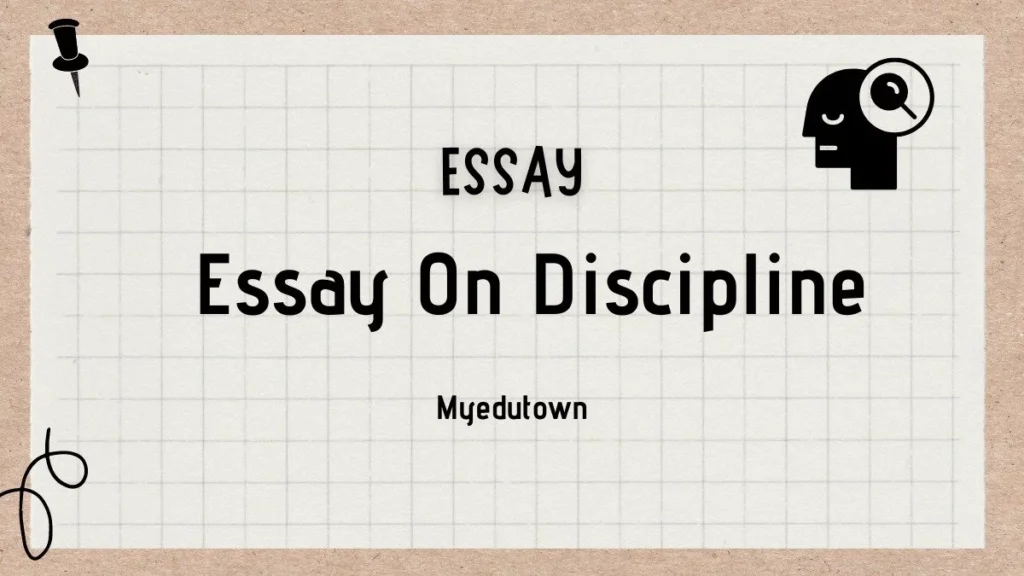
Essay on Discipline
Discipline is an important concept in society and in life. It is a virtue that helps individuals to be responsible, honest, and respectful towards themselves and others. Discipline helps individuals to be orderly, controlled, and well-behaved, enabling them to achieve their goals and objectives. It also helps individuals to develop self-control, focus, and determination, which are essential qualities for success in life.
Discipline is often thought of as punishment, but this is not necessarily the case. Discipline can be both positive and negative, depending on how it is applied. Positive discipline involves setting clear expectations, encouraging good behavior, and reinforcing good habits. It helps individuals to develop self-regulation and to make responsible choices. Negative discipline, on the other hand, involves punishment or consequences for inappropriate behavior. While negative discipline can be necessary at times, it is important that it is used sparingly and in a way that is fair and constructive.
One of the most important aspects of discipline is setting boundaries and rules. These boundaries help individuals to understand what is acceptable behavior and what is not, and they provide a sense of structure and stability. Rules can be set by parents, teachers, employers, or any other authority figure, and it is important that they are clearly communicated and consistently enforced.
Discipline is not just about enforcing rules, however. It is also about teaching individuals how to make good decisions, solve problems, and take responsibility for their actions. This involves teaching individuals how to think critically and make good choices, even when they are faced with difficult or tempting situations.
Effective discipline requires patience, consistency, and a willingness to listen and communicate. It is important that individuals are given the opportunity to express their thoughts and feelings, and that they are treated with respect and understanding. When discipline is applied in a caring and supportive manner, it can help individuals to learn and grow, and develop the skills and qualities needed for success in life.
In addition to the personal benefits of discipline, it is also important for the functioning of society as a whole. When individuals are disciplined and well-behaved, it creates a sense of order and stability in society. It enables people to work and live together in harmony, and it helps to prevent chaos and conflict.
Discipline is particularly important in the education system, as it helps students to focus and learn, and it enables teachers to teach effectively. When students are disciplined, they are more likely to be attentive, respectful, and motivated to learn. This, in turn, helps to create a positive and productive learning environment for all students.
Discipline is also important in the workplace, as it helps employees to be punctual, productive, and respectful towards their colleagues and superiors. It enables organizations to run smoothly and efficiently, and it helps to create a positive and professional working environment.
In addition to the benefits of the discipline for individuals and society, it is also important for personal and professional success. Discipline helps individuals to develop self-control and self-regulation, which are essential qualities for achieving goals and achieving success. It enables individuals to stay focused and motivated, even when faced with challenges and setbacks, and it helps them to overcome obstacles and achieve their full potential.
Importance of discipline
Discipline is a crucial component of a fulfilling and successful life. It allows individuals to set and achieve personal goals, make responsible decisions, and live a life of integrity and purpose. Discipline also helps individuals to develop self-control, focus, and determination, which are essential qualities for overcoming challenges and achieving success. Without discipline, it is easy to become distracted and lose sight of our aspirations and succumb to temptation and make poor choices. By cultivating discipline in our lives, we can gain a sense of direction and purpose, and we can create the foundations for a fulfilling and successful life.
Necessities of Discipline
Discipline is necessary for a number of reasons, all of which contribute to our overall well-being and success in life. First and foremost, discipline helps us to develop self-control and self-regulation. It enables us to resist temptation and to make responsible and informed decisions, rather than giving in to our impulses or emotions. This is particularly important in today’s fast-paced and overwhelming world, where we are constantly bombarded with stimuli and distractions. Without discipline, it is easy to become overwhelmed and to make rash or impulsive decisions that may have negative consequences.
Discipline is also necessary for achieving our goals and living a fulfilling life. It helps us to stay focused and motivated, even when faced with challenges and setbacks. It enables us to persevere and to work towards our aspirations, rather than becoming discouraged or giving up.
Additionally, discipline is necessary for creating a sense of order and stability in our lives. It helps us to be organized and to prioritize our tasks and responsibilities, enabling us to be more productive and efficient. It also helps us to be punctual and reliable, which is essential for building trust and credibility with others.
Finally, discipline is necessary for living a life of integrity and purpose. It helps us to be honest and responsible and to make choices that are consistent with our values and beliefs. By practicing discipline in our daily lives, we can create a sense of meaning and fulfillment, and we can be an example and inspiration to others.
Conclusion
In conclusion, discipline is an essential concept in society and in life. It helps individuals to be responsible, honest, and respectful, and to develop self-control, focus, and determination. It involves setting boundaries and rules, and teaching individuals how to make good decisions and take responsibility for their actions. Effective discipline requires patience, consistency, and a willingness to listen and communicate, and it is most effective when applied in a caring and supportive manner.




